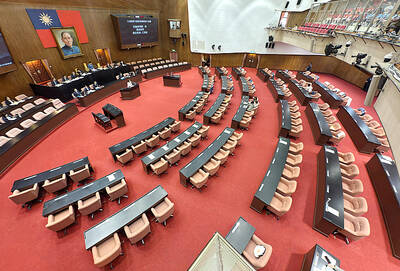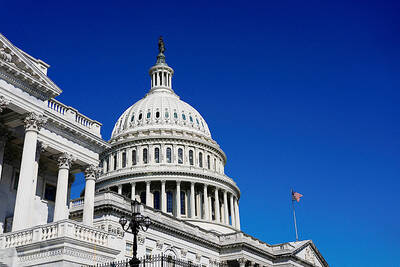Japanese household sentiment fell to a six-month low last month, indicating the need for measures to stimulate consumer spending and sustain a recovery from the country’s worst postwar recession.
The confidence index dropped to 37.6 last month from 39.5 in November, the Cabinet Office said yesterday in Tokyo. The government lowered its assessment of the report, describing sentiment as “weak.”
Japanese Finance Minister Naoto Kan yesterday urged lawmakers to pass a proposed ¥7.4 trillion (US$82 billion) extra budget for the current fiscal year, saying it would contribute 0.3 percentage point to economic growth.
Stimulus efforts implemented by the previous administration have begun to fade, signaling it is “far too early” to see a sustained recovery in consumer spending, economist Azusa Kato said.
“The stimulus was the only reason sentiment rallied as much as it did even when incomes were still plunging,” Kato, an economist at BNP Paribas in Tokyo, said before the report. “Sentiment is falling again because those boosts are waning, exposing the underlying weakness of domestic demand.”
Confidence among Japanese has been battered by 18 months of declining wages and unemployment near a postwar high.
A dearth of spending has caused consumer prices to decline for nine months as retailers discount products to attract customers.
The consumer confidence report, which also tracks households’ price expectations, showed that a growing number of consumers see deflation becoming more entrenched.
The portion of people expecting prices to fall exceeded those who see goods becoming more expensive for the first time since the survey began in April 2004. Thirty-two percent of consumers said prices would be lower a year from now, compared with 29 percent of those who see costs increasing.
Kan said yesterday that the economy was at risk of sliding back into a recession, stressing the need for parliament to pass the extra stimulus steps unveiled by Japanese Prime Minister Yukio Hatoyama last month.
“The economy is picking up, but it lacks strength for a self-sustained recovery,” Kan said.
The stimulus plan includes extending incentives introduced by the previous government to purchase environment-friendly products.
Not all analysts agree households will cut back amid signs of improvement in the job market.
The job-to-applicant ratio rose in November for a third month to 0.45, meaning there are 45 positions for every 100 candidates.
Manufacturers increased workers’ overtime hours for an eighth month as a jump in factory orders lifted labor demand.
Julian Jessop, chief international economist at Capital Economics Ltd in London, projects consumer spending will gain 1.8 percent this year.
“The purpose of the fiscal stimulus was to kick-start the economy and to stabilize the labor market. In that sense, it succeeded,” Jessop said. “We’re forecasting that consumer spending recovers its losses from the last two years.”

The Chien Feng IV (勁蜂, Mighty Hornet) loitering munition is on track to enter flight tests next month in connection with potential adoption by Taiwanese and US armed forces, a government source said yesterday. The kamikaze drone, which boasts a range of 1,000km, debuted at the Taipei Aerospace and Defense Technology Exhibition in September, the official said on condition of anonymity. The Chungshan Institute of Science and Technology and US-based Kratos Defense jointly developed the platform by leveraging the engine and airframe of the latter’s MQM-178 Firejet target drone, they said. The uncrewed aerial vehicle is designed to utilize an artificial intelligence computer

The Chinese Nationalist Party (KMT) caucus yesterday decided to shelve proposed legislation that would give elected officials full control over their stipends, saying it would wait for a consensus to be reached before acting. KMT Legislator Chen Yu-jen (陳玉珍) last week proposed amendments to the Organic Act of the Legislative Yuan (立法院組織法) and the Regulations on Allowances for Elected Representatives and Subsidies for Village Chiefs (地方民意代表費用支給及村里長事務補助費補助條例), which would give legislators and councilors the freedom to use their allowances without providing invoices for reimbursement. The proposal immediately drew criticism, amid reports that several legislators face possible charges of embezzling fees intended to pay

REQUIREMENTS: The US defense secretary must submit a Taiwan security assistance road map and an appraisal of Washington’s ability to respond to Indo-Pacific conflict The US Congress has released a new draft of the National Defense Authorization Act (NDAA), which includes up to US$1 billion in funding for Taiwan-related security cooperation next year. The version published on Sunday by US House of Representatives Speaker Mike Johnson removed earlier language that would have invited Taiwan to participate in the US-led Rim of the Pacific Exercise (RIMPAC). A statement on Johnson’s Web page said the NDAA “enhances U.S. defense initiatives in the Indo-Pacific to bolster Taiwan’s defense and support Indo-Pacific allies.” The bill would require the US secretary of defense to “enable fielding of uncrewed and anti-uncrewed systems capabilities”

Renewed border fighting between Thailand and Cambodia showed no signs of abating yesterday, leaving hundreds of thousands of displaced people in both countries living in strained conditions as more flooded into temporary shelters. Reporters on the Thai side of the border heard sounds of outgoing, indirect fire yesterday. About 400,000 people have been evacuated from affected areas in Thailand and about 700 schools closed while fighting was ongoing in four border provinces, said Thai Rear Admiral Surasant Kongsiri, a spokesman for the military. Cambodia evacuated more than 127,000 villagers and closed hundreds of schools, the Thai Ministry of Defense said. Thailand’s military announced that